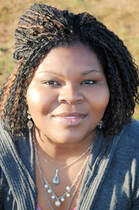|
I think I had attended a funeral or two before that of my grandfather’s in 1986, but his was the first that I recall having any true impact on me. I recall his illness and surgeries, his recovery, and his relapse. I loved my grandfather, and I still cherish his memories. I’ve told my children how he kept a ladle hanging on a nail next to the kitchen sink that he sipped water from--he never dirtied a cup. He never made work for others, he kept to himself, didn’t raise his voice, never caused any commotion. He passed away on the Friday evening that started our Spring Break. I recall being at home with my sisters and my mom’s cousin, our babysitter, when the phone rang--the one on the wall in the kitchen. She answered, spoke briefly then hung up. She said, “y’all grandaddy dead.” She sat down and cried. I cried. As was my grandfather’s way, even in death he caused no commotion, with it being Spring break, we didn’t miss even one day of school. I believe it was my mother who called from the hospital to tell us the sad news, but too often, these days, people find about the death of a loved one on social media. Social media is fairly new, but the desire to be the first to know, or the one to tell the news, is not. In the book of 2 Samuel, there are hard feelings between David and his son Absalom. Absalom tried to overthrow David as king, but David had devised a plan to fight back. Knowing his son could be killed, David requested that his men, “Be gentle with the young man Absalom for my sake.” Once Absalom is dead, someone must tell David. 2 Samuel 18: 19-23
The need, the desire to run and tell is not new. I suppose it is a need to feel important. We associate being in-the-know with our worth. We think others will covet our closeness to the situation if we tell them the news rather than vice-versa. This need and the actions that follow can be hurtful. We always remember how we learned of the death of a loved one. That news should be delivered with tender, loving care. There is great responsibility with this news. We should allow the family time to become informed, time to grieve, and time to inform the public. If you are not the one God has chosen to deliver the news, it’s dangerous to put yourself in that position as we cannot predict what will happen next. In 2 Samuel 1, an Amalakite brings the news of Saul’s death to David--he even fabricates a portion of the story saying Saul was leaning on his spear ( v. 6) and asked the man to go ahead and kill him (v. 9). The man thinks this news will make David happy, but it infuriates him! David has his men kill the Amalakite (v. 15) for taking the life of God’s appointed king.
In Matthew 28, after Jesus was crucified, Mary Magdalene and the other Mary went to look at the tomb. Following a violent earthquake, they found that the stone had been rolled away and Jesus was gone. An angel explained that Jesus had risen. The angel told them to “go quickly and tell his disciples: ‘He has risen from the dead and is going ahead of you into Galilee. There you will see him.’ Now I have told you.” They were in-the-know. They were told to go spread the word. This is the news we should all tell! This news will bring us reward! Run - tell that! AMEN! Have a blessed week! Kim
1 Comment
|
I am a wife, mother, educator, and author who, between other duties, enjoys writing. My name is actually Kimberly Griffith Massey. In this blog, I will share some sighting of God's light each week.
Author Photo by Heather G. Rollings, 2017 Cover photo by Carlton Griffith Photography www.carltongriffith.com Archives
December 2019
|
All rights reserved. Copyright 2024 Human Terms Publishing & Educational Services, LLC
Proudly powered by Weebly




 RSS Feed
RSS Feed


